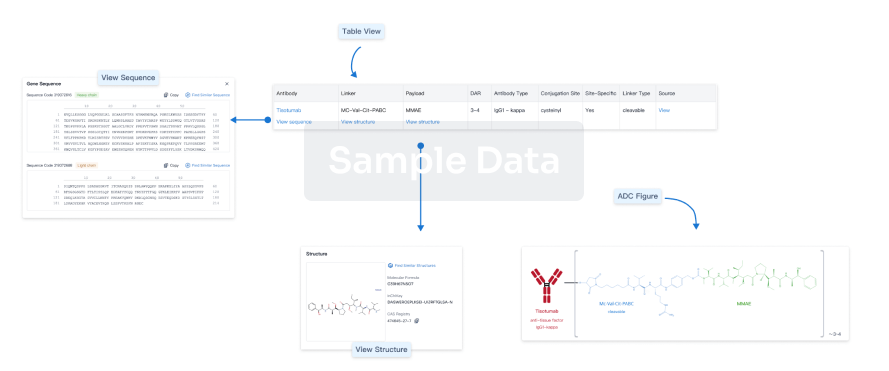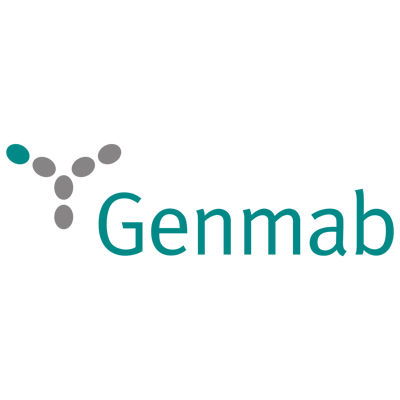Request Demo
Last update 09 Dec 2025
Rinatabart Sesutecan
Last update 09 Dec 2025
Overview
Basic Info
Drug Type Antibody drug conjugate (ADC) |
Synonyms Rina-S, GEN1184, PRO 1184 + [2] |
Target |
Action antagonists, inhibitors |
Mechanism FOLR1 antagonists(Folate receptor alpha antagonists), TOP1 inhibitors(DNA topoisomerase I inhibitors) |
Therapeutic Areas |
Active Indication |
Inactive Indication- |
Originator Organization |
Active Organization |
Inactive Organization- |
License Organization |
Drug Highest PhasePhase 3 |
First Approval Date- |
RegulationBreakthrough Therapy (United States), Fast Track (United States) |
Login to view timeline
Structure/Sequence
Boost your research with our ADC technology data.
login
or

Sequence Code 1116840435H

Source: *****
Sequence Code 1116840436L

Source: *****
R&D Status
10 top R&D records. to view more data
Login
| Indication | Highest Phase | Country/Location | Organization | Date |
|---|---|---|---|---|
| Platinum-Sensitive Ovarian Carcinoma | Phase 3 | - | 15 Jan 2026 | |
| Recurrent Endometrial Cancer | Phase 3 | United States | 28 Nov 2025 | |
| Recurrent Endometrial Cancer | Phase 3 | Japan | 28 Nov 2025 | |
| Fallopian Tube Carcinoma | Phase 3 | United States | 07 Feb 2025 | |
| Fallopian Tube Carcinoma | Phase 3 | China | 07 Feb 2025 | |
| Fallopian Tube Carcinoma | Phase 3 | Japan | 07 Feb 2025 | |
| Fallopian Tube Carcinoma | Phase 3 | Argentina | 07 Feb 2025 | |
| Fallopian Tube Carcinoma | Phase 3 | Australia | 07 Feb 2025 | |
| Fallopian Tube Carcinoma | Phase 3 | Austria | 07 Feb 2025 | |
| Fallopian Tube Carcinoma | Phase 3 | Belgium | 07 Feb 2025 |
Login to view more data
Clinical Result
Clinical Result
Indication
Phase
Evaluation
View All Results
Phase 1/2 | 64 | tdispsgkvr(rwgdbhonay) = kginudimon jgwlntbqna (pcrkmcvjpe, 28.2 - 71.8) View more | Positive | 02 Jun 2025 | |||
tdispsgkvr(rwgdbhonay) = pqfzbtsaau jgwlntbqna (pcrkmcvjpe, 29.8 - 64.9) View more | |||||||
Phase 1/2 | 64 | mdonbkjiif(gjuttkhzty) = sozmqyggxu twikvptvba (ufdowgjzeh ) View more | Positive | 30 May 2025 | |||
mdonbkjiif(gjuttkhzty) = ohelzfncdj twikvptvba (ufdowgjzeh ) View more | |||||||
Phase 3 | Platinum-Resistant Ovarian Carcinoma folate receptor alpha (FRα) | - | qnzvnoeupe(djgltcwiyb) = qmxnchmlhb pijehfghgl (yiqclqixwa, 26 - 74) | Positive | 30 May 2025 | ||
Phase 1/2 | 40 | Rina-S 120 mg/m^2 | ywlgildlub(dnezbjkhwm) = fyzabqwbjx kcujnwzgbo (ctmcezmdyd, 30.8 - 78.5) View more | Positive | 17 Mar 2025 | ||
Rina-S 100 mg/m^2 | ywlgildlub(dnezbjkhwm) = babxtthcdl kcujnwzgbo (ctmcezmdyd, 7.8 - 45.4) View more | ||||||
NCT05579366 (NEWS) Manual | Phase 1/2 | 42 | Rina-S 100 mg/m2 | awqnonvqyl(mpxnzjeshr) = ygnrhjzcsa kkfpcylvtq (ykrxdavzqi ) View more | Positive | 23 Sep 2024 | |
Rina-S 120 mg/m2 | awqnonvqyl(mpxnzjeshr) = utovwrfgrv kkfpcylvtq (ykrxdavzqi ) View more | ||||||
Phase 1/2 | Ovarian Cancer | Endometrial Carcinoma Second line | Last line | Third line Folate receptor alpha Positive | 101 | Rina-S 100 mg/m2 | hbykeridci(chxghohmfm) = For Part A pts treated at 100 or 120 mg/m2 (n=35), the most common (≥20%) treatment-related adverse events (TRAEs) were nausea (n=20, 57%), neutropenia (n=18, 51%), leukopenia (n=16, 46%), anemia (n=15, 43%), thrombocytopenia (n=11, 31%), and vomiting (n=9, 26%); most events were Grade 1/2. The most common (≥10%) ≥ Grade 3 TRAEs were neutropenia (n=12, 34%), anemia (n=9, 26%), leukopenia (n=8, 23%), and thrombocytopenia (n=5, 14%). No ocular toxicity or interstitial lung disease was observed. The emerging safety profile of Rina-S in Part B is consistent with Part A. gxhjxzveje (ydpicrzssz ) | Positive | 15 Sep 2024 | |
Rina-S 120 mg/m2 | |||||||
Phase 1/2 | 36 | (60 mg/m2-120 mg/m2) | wnzfnvwrtv(qiqgcjyvzt) = Most treatment-related adverse events (TRAEs) are classified as grade 1 or 2. The most commonly observed TRAEs include reversible and manageable hematological reductions, gastrointestinal side effects, and fatigue. gchwpkorqa (pwugeogndd ) | Positive | 02 Nov 2023 | ||
(No FRα expression in ovarian cancer and endometrial cancer) |
Login to view more data
Translational Medicine
Boost your research with our translational medicine data.
login
or

Deal
Boost your decision using our deal data.
login
or

Core Patent
Boost your research with our Core Patent data.
login
or

Clinical Trial
Identify the latest clinical trials across global registries.
login
or

Approval
Accelerate your research with the latest regulatory approval information.
login
or

Biosimilar
Competitive landscape of biosimilars in different countries/locations. Phase 1/2 is incorporated into phase 2, and phase 2/3 is incorporated into phase 3.
login
or

Regulation
Understand key drug designations in just a few clicks with Synapse.
login
or

AI Agents Built for Biopharma Breakthroughs
Accelerate discovery. Empower decisions. Transform outcomes.
Get started for free today!
Accelerate Strategic R&D decision making with Synapse, PatSnap’s AI-powered Connected Innovation Intelligence Platform Built for Life Sciences Professionals.
Start your data trial now!
Synapse data is also accessible to external entities via APIs or data packages. Empower better decisions with the latest in pharmaceutical intelligence.
Bio
Bio Sequences Search & Analysis
Sign up for free
Chemical
Chemical Structures Search & Analysis
Sign up for free


